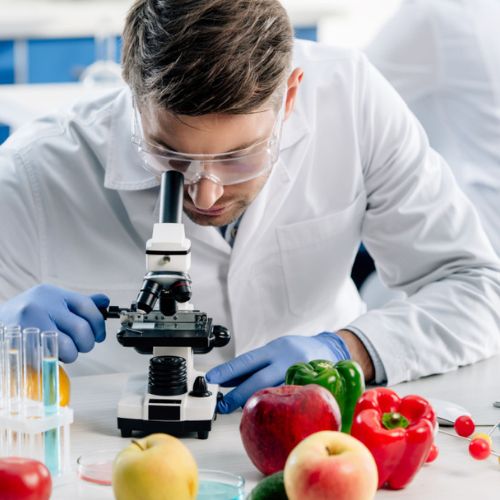When it comes to ensuring the safety of the food we consume, we often think of human food, but what about the food we provide to animals? Animal food and feeds play a crucial role in the health and well-being of pets, livestock, and other animals. This is where food testing services come into play. Comprehensive testing ensures that animal food products are free from harmful contaminants and meet nutritional standards, safeguarding not just animal health but also the broader ecosystem.
In this article, we’ll delve into the importance of food testing for animal food and feeds safety, touching on how it helps prevent disease, guarantees nutritional value, and ensures the safety of the food products that animals consume.
Why Is Food Testing for Animal Feeds Crucial?
Animal food and feeds are essential for the proper growth, development, and maintenance of animals. However, improper feed can lead to serious health issues, including nutrient deficiencies, poisoning, and diseases that can affect both animals and humans indirectly. Proper food testing for these products is crucial in preventing such issues and ensuring that animal food is safe and nutritious.
- Nutritional Balance and Quality: Animals, just like humans, require a balanced diet to maintain health. Food testing services help assess the nutritional content of animal food, ensuring it contains the necessary vitamins, minerals, proteins, fats, and carbohydrates in the right proportions. Without testing, there’s no way to verify if the feed is meeting these nutritional requirements.
- Contaminant Detection: Animal food and feeds can sometimes be contaminated with harmful substances such as pesticides, heavy metals, or mycotoxins. These contaminants pose serious risks to the health of the animals and can even end up in the food chain, affecting humans. Food testing services play a crucial role in detecting these contaminants before they cause harm.
- Preventing Disease Transmission: Certain pathogens, such as bacteria and viruses, can thrive in animal food and feed products. Food testing services can identify the presence of harmful microorganisms that could lead to disease outbreaks, not only in animals but also in humans who may consume animal products like meat, eggs, or milk.
- Regulatory Compliance: Governments and international organizations set strict standards for animal feed and food products to ensure safety. Regular testing ensures that animal food and feeds comply with these regulations, which helps companies avoid legal penalties and recalls.
- Consumer Confidence: Consumers today are more aware of food safety and quality than ever before. For pet food manufacturers and livestock feed producers, providing tested, certified products not only boosts confidence but also enhances the brand’s reputation.
Key Categories of Animal Food and Feeds Tested
Food testing isn’t just limited to animal feed in its basic form; it extends to a variety of processed and specialized products. Here are some common products that undergo rigorous food testing to ensure their safety and quality:
1. Biscuit and Cookies
While primarily a human snack, biscuits and cookies meant for animal consumption, especially for pets, must meet specific nutritional standards. Testing helps confirm they are safe, without any harmful chemicals or additives that could cause digestive issues or allergic reactions in animals.
2. Ghee & Cheese
Animal feed products like ghee and cheese are rich in fats and proteins. Testing ensures that these products meet the required standards for freshness and nutritional content while also being free from harmful bacteria and toxins.
3. Dehydrated Peas
Dehydrated peas are often used as a source of protein in animal diets. They are tested for moisture levels, pesticides, and microbial contamination to ensure they remain safe and nutritious for animals.
4. Edible Common Salt
Salt plays a crucial role in the dietary needs of animals, but excessive or insufficient salt can cause health problems. Regular testing ensures the right levels of sodium chloride in animal feed products.
5. Edible Oils & Fats
Animal fats and oils, such as those used in feeds, must meet certain quality standards. Food testing services can check for free fatty acids, rancidity, and the presence of harmful substances in these products.
6. Food Grains (Pulses & Whole Grains)
Grains are a fundamental part of many animal diets. Testing for pesticide residues, mycotoxins, and other contaminants ensures that these grains are safe for animal consumption and won’t cause harm to their health.
7. Dry Fruits
Dry fruits are commonly added to animal food products for additional nutrients. Testing ensures they are free from preservatives and chemicals that could be toxic to animals.
8. Gur & Honey
Gur (jaggery) and honey, often used in animal treats, need to be tested for purity and the presence of any additives that could impact animal health.
9. Ketchup Sauce
While ketchup sauce isn’t a staple in animal diets, it can occasionally be used in food preparation. Testing ensures that the sauce is free from harmful preservatives or ingredients that may be unsafe for animals.
10. Maida & Macaroni Products
Processed food products such as maida (refined wheat flour) and macaroni can be part of animal feed. These products must be tested to ensure they are free from allergens and contaminants that could impact animal digestion and health.
11. Non-Alcoholic (Carbonated Water and Drinks)
While animals don’t typically drink carbonated beverages, these can sometimes appear in specialized pet treats. Testing ensures that the beverages are non-toxic and free from any harmful substances.
12. Ready-to-Eat Food Products & Namkeen
Ready-to-eat food products, particularly for pets, need to be tested for nutritional balance, contamination, and shelf life to ensure they are safe and beneficial for consumption.
13. Skimmed / Evaporated / Dried Milk Powder
Dairy products like milk powder are frequently used in animal feeds. These are tested for microbial safety, nutritional content, and the absence of harmful additives or preservatives.
14. Spices
Spices used in animal food, particularly for flavoring, need to undergo rigorous testing to ensure they are free from heavy metals, pesticides, and other harmful substances.
The Role of Food Testing Services in Animal Health
Animal food and feed testing services help manufacturers ensure the highest safety standards for animal nutrition. Laboratories use a variety of tests to evaluate various aspects of food quality, such as:
- Microbiological Tests: Detect harmful bacteria like Salmonella, E. coli, and other pathogens that could cause foodborne illnesses in animals.
- Chemical Residue Analysis: Ensures that harmful chemicals, pesticides, or heavy metals are not present in the feed or food products.
- Nutritional Analysis: Checks the level of essential nutrients like proteins, fats, and vitamins to make sure the food meets the dietary needs of animals.
- Physical Examination: Includes tests for texture, moisture content, and appearance, ensuring the product is in optimal condition for consumption.
Conclusion: Ensuring the Safety of Our Animal Friends
Food testing for animal food and feeds is essential to maintaining the health and safety of animals. From biscuit and cookies to spices and ready-to-eat food products, thorough testing helps ensure that animal food products are free from harmful contaminants and meet the required nutritional standards. By working with trusted food testing services, manufacturers can provide safe, nutritious, and high-quality products, fostering better health for pets, livestock, and other animals, and protecting the food chain as a whole.
To ensure the well-being of animals, it is essential to prioritize food safety and quality through rigorous and reliable food testing practices. Whether you’re producing ghee & cheese, dry fruits, or non-alcoholic drinks for animal consumption, always make sure your products undergo comprehensive testing to safeguard the health of our animal companions.


